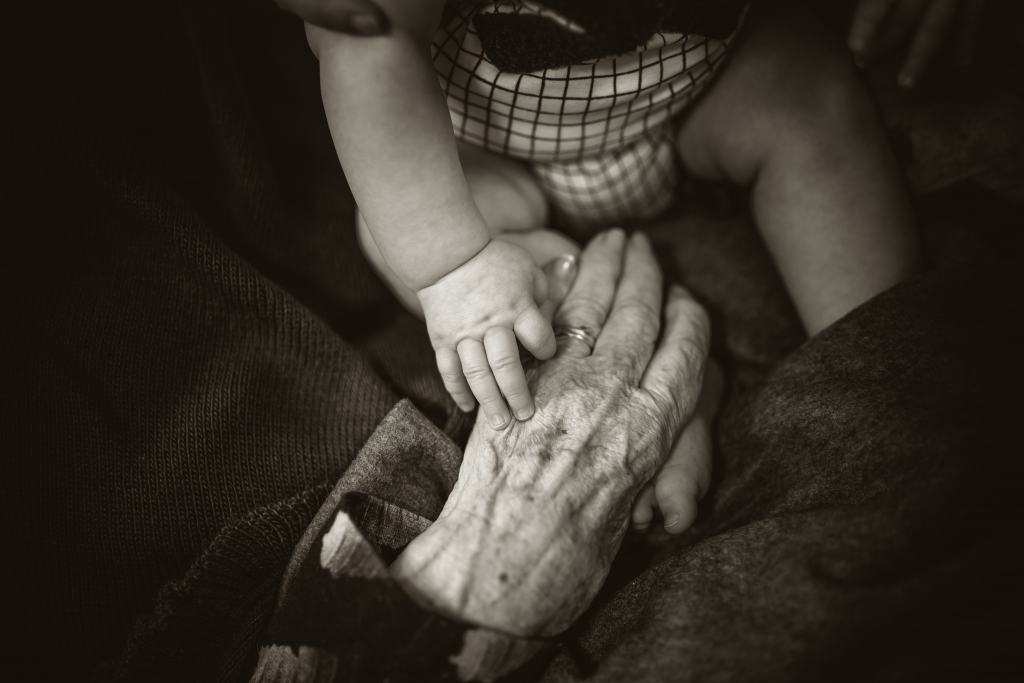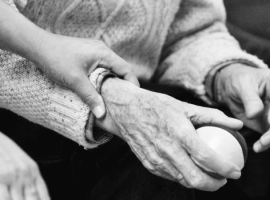Dementia 101 – From a Caregiver
In this post, Geeta Iyer explains dementia, its early signs, and the difference between age-related memory loss and dementia from a layperson’s perspective. As a caregiver to her loved one [(LO); her 94-year-old dad] living with dementia, she spreads her knowledge and views up, close, and personal.
“Cognition is a term referring to the mental processes involved in gaining knowledge and understanding. These processes include thinking, knowing, remembering, judging, and problem solving.”

“My mother is 88 and is beginning to forget things.” Someone I had met in a discussion group commented.
“May not necessarily mean dementia. Have you gotten her checked out?” I asked. “I haven’t taken her to a doctor. I am just handling it myself,” she said.
Not uncommon at all, I thought. I often wondered if the word dementia ever came up in my mind until three years ago. I asked my sister in the US if she remembered how it all started for dad and why we decided to get him checked out in the first place. Why didn’t we assume it was just a normal, age-related decline? After all, he was 94 and things are bound to get a bit rusty, especially our memory.
Age-related memory loss vs dementia
“While dementia is more common as people grow older, it is not a normal part of aging. Many people live into their 90s and beyond without any signs of dementia. One type of dementia, frontotemporal disorders (FTD) is more common in middle-aged than older adults.”
As it often does, it began even before 2016 when dementia came into our lives, with dad not remembering conversations, names, words, and people. Most of that happens to me as well. He was still quite independent, and I could leave him alone at home if I had to take mom for a doctor’s appointment. But he would get a bit lost and distracted if the conversation became a bit complex and was unable to make up his mind when given several choices. Again, seemed innocuous enough at his age.
Early signs
Confusion about where he was, who some of us were, and inability to comprehend simple sentences were the early signs. There were frequent and unpredictable mood swings during the day. Around 4 pm every day, he would have this “I don’t know what’s going on!” look on his face. He was often on a train, in his new reality. The obsessive, repetitive folding of blankets around him (it was winter) was another new behavior. He was still independent as far as eating, the use of bathroom, and personal hygiene were concerned but could no longer be left alone to take care of himself. After shower, he would often wear the same clothes he had worn before and throw the clean clothes in the wash pile. There were other behavioral changes, such as stashing his underwear in a drawer not intended for clothes. We decided to take him to a neurologist.
MCI (Mild Cognitive Impairment)
“Dementia ranges in severity from the mildest stage, when it is just beginning to affect a person’s functioning, to the most severe stage, when the person must depend completely on others for basic activities of living.”
It was mid 2017 in Michigan. The neurologist put dad through some cognitive tests while I chatted with the social worker in a separate room. Her comments read “mild to moderate cognitive decline” which I didn’t understand then to correlate to dementia. We didn’t want to subject my dad to diagnostic tests, such as the MRI, he probably wouldn’t have been patient through it. My sister, who is a medical doctor, guessed his dementia was mostly due to Alzheimer’s.
Alzheimer’s vs dementia
A very common question I see asked on caregiver forums relates to the difference between Alzheimer’s and dementia. I understand Alzheimer’s to be a disease and dementia to be a symptom of that disease.
The following, more elaborate explanation from an online search may be helpful:
Dementia is a collective term used to describe various symptoms of cognitive decline that result from severe changes in the brain. These changes make it difficult for people to perform basic daily activities as areas of the brain controlling memory, communication, and thinking are impaired. Dementia is not a disease in itself, but a general term to describe symptoms of several underlying diseases and brain disorders, including Alzheimer’s.
Alzheimer’s disease (AD) is a disease cause by abnormal deposits of protein in the brain that destroy cells in the areas of the brain that control memory and mental functions. AD is the likely cause of the majority of dementia cases.
Types of Dementia
One of my friends, who had been caring for his mom with dementia, asked me what type of dementia dad had. I did not understand the question then, but now believe he was referring to the different diseases that could cause dementia. Alzheimer’s, Parkinson’s, Lewy body dementia, FTD, Vascular dementia, etc.
Another friend of mine had stories about her dad with dementia with the warning “Be prepared. It is only going to get worse.” Therefore, once dad’s symptoms started getting worse, I was less concerned about a precise diagnosis about the dementia type, and more interested in managing the symptoms. I do believe a diagnosis is essential in ruling out any treatable condition that may be causing dementia, but in general, I have accepted that my dad has a condition that has no cure (yet) and will progressively worse. May sound cold and uncaring, but I think I am better off not living in an imaginary world of false hopes and focusing on managing my situation.
Stages of dementia
“What stage of dementia is your loved one (LO) in?”
Another popular caregiver topic that I believe is irrelevant to my role as a caregiver. There are apparently seven stages with a mapping of symptoms to each. Dad is probably hovering between five and six, but who cares really? If someone told me he is in stage four, would it change anything I do now? I doubt it.
In the past year, since our return to India, there has been a steady decline in my dad’s mental faculties affecting various aspects of his life. He can no longer bathe or dress himself, needs help using the toilet and often has to be fed. He just had a miserable day yesterday as he had imagined committing a grave, ‘unpardonable’ mistake. He often forgets he has eaten (or bathed) five minutes after the event. There are times he won’t recognize the food on the plate and will ask “What am I supposed to do?”
I think becoming familiar with our LO’s behavioral patterns and figuring out what is most effective in dealing with their dementia is important. If they become unmanageable and chemical intervention is required, so be it. If there are activities that can engage them, that is wonderful. For my dad, I have a very short list of my go-to activities, namely, music and prayers that are familiar to him. Apparently, dementia often spares that part of the brain.
This is something all of us would want to know so that we can take steps to dodge the damn thing! My unscientific assessment is that there are genetic, environmental, and lifestyle components in play. Not all old people get it and not all young people are spared (early onset). It may help us to lead an active and healthy life using all of our faculties, so our brain cells don’t atrophy. But then, everyone who knew my dad talks about how engaged he was in everything around him and I knew what a physically active person he was.
As a caregiver, I often wonder if moving to the US might have had something to do with it. He needed to be independent and have a sense of purpose. He was never someone to read a book or enjoy a quiet moment by himself. Macular degeneration of his eye took away his ability to even read the newspaper or write e-mails to his friends. The sudden loss of hearing caused by antibiotics traumatized him as he suddenly felt even more isolated. He stopped participating in conversations when we had company-just would keep staring into the space in front of him. How many of us really try to include our elders while we are enjoying ourselves with our friends and relatives? My nonprofessional opinion is that social isolation can cause dementia.
In January 2016, dad had a heart valve replacement, which required anesthesia. That year was the beginning of the end of my dad as I always knew him. His cardiologist allayed our fears by saying, “I would do it if it were my dad. The quality of his life will improve tremendously.” It certainly did in terms of making his heart stronger and making him physically healthier. But the question remains, “Does anesthesia increase the chances of dementia in elders?”
“Touch has memory.” – John Keats
I saw something beautiful the other day, a moving picture of this young girl kissing an old lady on her forehead along with the above quote.

While my dad doesn’t recognize me or my mom, he always smiles when I hold his hand, hug him, or kiss him. I like to think that he just remembers us differently now, not by name or face. The other day I was sitting on the couch, when he walked towards me from across the room, sat down, and put his head on my lap. Then, he was quiet for a long time while I brushed his hair with my fingers.
I think touch is familiarity and his recognition.
Related Links
- https://www.brainandlife.org/articles/not-all-dementia-is-alzheimers-disease-knowing-the-difference-affects/
- http://www.alzeducate.ca/course/index.php?categoryid=3
- https://www.dementia.org.au/information/about-dementia/how-can-i-find-out-more/warning-signs-of-dementia
- https://www.kindlycare.com/stages-of-dementia/#section_9
- https://drmikechua.com/stages-of-dementia/
- https://www.nhs.uk/conditions/dementia/causes/
- http://www.ageucate.com/blog/healing-power-touch-dementia-care/



There are no comments